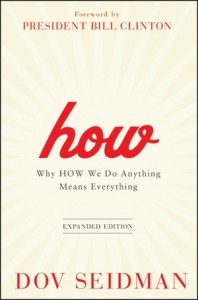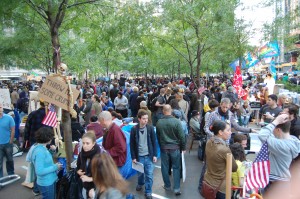Scripture
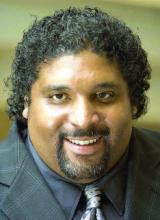
The better way says, if we follow God’s religious values we can use global technology, green economy, and targeted economic and infrastructure investment, total access to education, and creative job creation strategies to address the ugly realities of poverty. If we follow the enduring ethic of love we can beat our swords of racism into the plows that will till the new soil of brotherhood and sisterhood
If we see the poor as our neighbors, if we remember we are our brother’s keeper, then we shall put the poor, rather than the wealthy, at the center of our agenda.
If we hold on to God’s values, the sick shall have good health care. The environment shall be protected. The injustices of our judicial systems shall be made just. We shall respect the dignity of all people. We can love all people. We can see all people as God’s creations.
We can use our resources to develop our minds and economy, rather than build bombs, missiles, and weapons of human destruction.
Do we want to keep pressing toward God’s vision? Values are once again the question of our times.
Do we want a just, wholesome society, or do we want to go backwards? This is the question before us. And I believe that at this festival there is still somebody who wants what God wants. Somebody who understands there are some things with God that never change
There are still some prophetic people that have not bowed, who as a matter of faith know that Love is better than hate. Hope is better than despair. Community is better than division.
Peace is better than war. Good of the whole is better than whims of a few. God wants everybody — red, yellow, black, brown and white taken care of. God wants true community, more togetherness … not more separateness. God wants justice, always has, always will.
Because with God some things never change.
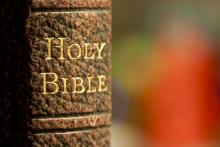
After reading my post about Randy Wolford, the snake-handling pastor, died from a venomous snakebite, fellow God's Politics blogger Tim Suttle sent me a link to his own post on the subject. Suttle’s angle was different, and I found it fascinating.
Basically, he contends that the verses in Mark that Wolford and others use to justify handling snakes as an act of worship (among other bizarre practices) should not ever have made it into the Bible to begin with. His article cites what he calls a “nerdy academic journal article” from Bible scholar Robert H. Stein. In it, Stein notes a few reasons why the text in Mark chapter 16 beyond verse 8 should never have been included in the Bible.
First, there have been older copies of the manuscripts from which Mark was produced that stop at Mark 16:8. In addition, there’s the historical agreement among scholars that scribes (the guys who copied the texts by hand) did have a propensity for adding to the documents they copied but seldom, if ever, deleted anything. There’s also the fact that ancient scholars whose commentaries on Mark have been found do not mention these verses at all, as well as the agreement among many Biblical scholars that the tone of those verse suggests a different author wrote them.
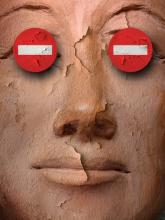
When I am faced with dishonesty and fraud on a systemic scale, I ask my questions of God. But I am continually directed back to humanity itself to find the origins of injustice.
So what can we do to end injustice?
The Washington Post reported on the massive falsification of documents by banks:
“Employees at major banks who churned out fraudulent foreclosure documents, forged signatures, made up fake job titles and falsely notarized paperwork often did so at the behest of their superiors, according to a federal investigation released Tuesday....
"‘I believe the reports we just released will leave the reader asking one question: How could so many people have participated in this misconduct?’ David Montoya, HUD inspector general, said in a statement. ‘The answer: simple greed.’”
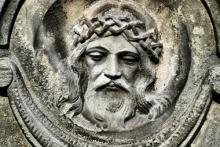
There was a movement back in the 1960s that many of us only have read about, while others vividly remember. Philosophers and theologians explored what was labeled the “Death of God” movement. Interest in the subject has re-emerged particularly as of late because William Hamilton, one of the more prominent voices in the Death of God movement, diedlast week at age 87.
The movement inspired TIME Magazine’s now-famous cover (seen here) in 1966, raising the question in the public forum: Is God Dead? The cover has since been listed by the Los Angeles Times as one of the “Ten Covers that Shook the World.”
Hamilton’s faith was shaken during his teenage years when three of his friends were making a homemade pipe bomb. The project went wrong and detonated, killing two of the three boys.
The two killed were Christians. The lone survivor, an atheist.
Hamilton’s crisis of faith centered around a theological concept known as theodicy, which explores the question: why do bad things happen to good people? More specifically, why does misfortune seem to befall the faithful, while those lacking faith enjoy what seems to be a providential hall pass?
Eugene Peterson has written more than 30 books on theology and the life of faith in his 80 years, but he is perhaps best known for the one book he didn’t write: The Bible.
Peterson’s “para-translation” of the Bible, The Message: The Bible in Contemporary Language, was published over a span of nine years, from 1993 to 2002. And even a decade after its completion, critics still are debating the merits and missteps of his translation of Holy Writ into idiomatic, sometimes colloquial, modern English. To date there are more than 15 million copies of The Message in print.
During the two-day Q Practices gathering in New York City this week, Peterson talked about the epic translation project he says he still can’t believe he actually managed to complete.
“I didn’t feel it was anything special when I was doing it,” Peterson said. “I can’t believe I did this. Reading it now I think, ‘How did I do this?’ It truly was a work of the Holy Spirit.”

The question is, are we listening? For God, who hears the prayers of God's people, is calling us to listen as well. God's justice is a collective project.
But when we listen, we hear stories of oppression, corruption, and injustice, in the face of honesty and hard work. But listening is not enough. When we listen, God calls us from the quiet of prayer to be a healing presence in the world.
"She looks well to the ways of her household, and does not eat the bread of idleness." - Proverbs 31:27

This past Sunday, Erick Erickson, editor-in-chief of the blog Red State wrote a post titled “The Perversion of the Words of Our Lord Jesus Christ by the Sinner Barack H. Obama."
First, I hope that Erickson remembers that in the Christian tradition calling someone a “sinner” is a theological statement of fact, not a pejorative. Labeling another Christian as a sinner in a bold and brash headline is, I am sure, very gratifying, but it hardly sets one up for an argument based in the teachings of Jesus who came not for the healthy but the sick or Paul who labeled himself the “chief of sinners.”
So, let me get this out of the way. I, Timothy M. King, am a sinner too.

Did you hear a particularly good sermon, homily, teaching, preaching, lesson or message this Sunday?
We'd love it if you'd share it with us.
Please email Cathleen (cfalsani@sojo.net) with links to audio, video or text versions of the message you heard, and we'll share the best of the best with the rest here on God's Politics.

Jimmy Carter is the 39th president of the United States, founder of the Carter Center and recipient of the Nobel Peace Prize. He has authored many books, the most recent being "Through the Year with Jimmy Carter: 366 Daily Meditations from the 39th President." In the wide-ranging interview that follows on the blog, the Huffington Post's Senior Religion Editor Paul Raushenbush spoke to President Carter by phone about the role faith played in the Israel-Egypt Peace Treaty, the time of his greatest alienation from God, faith in the White House and his personal daily devotional practice. This post originally appeared on HuffPo.

Tweeting the Bible, designing the Bible. Choosing an ethical restaurant. Paper sculptures. Ron Swanson cookies. Whisker Wars!
I believe that there is a basic human dignity inherent in work. In fact, the Bible even makes special provisions to provide jobs for those who otherwise wouldn’t have one. But, when it comes to the messy legislative process, no one can claim God’s special favor on a particular bill. It is, however, appropriate to discuss what kind of moral principles legislation should try to promote.
In St. Paul’s second letter to the Thessalonians, he writes, “Those unwilling to work will not get to eat." Paul goes on to warn about those who are idle and the negative effect they can have on a community. It was essential that every person work for their own well-being and for the health of the entire community.
Hard work was praised by early Christians, but so was ensuring that every person was provided for. Acts 2 says “All the believers met together in one place and shared everything they had. They sold their property and possessions and shared the money with those in need.”
These passages could be pitted against one another. One side argues for strict capitalist principles in which the lazy starve. The other models a communal society that shares and redistributes private property. But understood properly, they actually work together.
This morning, as I caught up on what had been going on in the world over the weekend, I stumbled across a very interesting resource -- a website that compares the frequency with which words appear in the Bible and the Quran.
Although that in itself is an interesting tool, I was less interested in the comparison feature and more interested to see how often certain words appear in the Bible.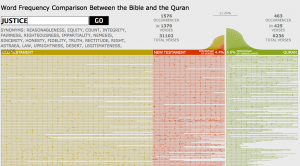
Editor's Note: HuffPost Religion is running a series of posts by Sojourners' Director of Mobilizing Lisa Sharon Harper and D.C. Innes, her co-author on the new book, Left, Right and Christ: Evangelical Faith in Politics, about how Christians should view social issues. Their first issue is Occupy Wall Street.
Scripture constantly should be challenging our assumptions about our lives and in every aspect of society. Transformation is needed on a personal and also a political level. Scriptural priorities shouldn't be glossed over in order to protect political ideologies and comfort zones.
If we believe that what Jesus taught remains just as relevant today as it did when he physically walked among us, then it should still be a comfort to those on the margins of society and offensive to the wealthy and powerful. That doesn't mean that the wealthy and powerful can't be good and faithful followers of Christ, but Jesus did warn them that their walk will be a hard one. Wealth and power bring unique and difficult temptations ... If you never feel uncomfortable when you read the Gospels then you aren't paying attention.
Not every Christian who shares my concern for the poor has the same view on policy or politics. But, here is a prejudice I am not going to back away from.
To be a follower of Christ is to be biased for the poor.
In life, we all have our biases. Some of them are natural tendencies or inclinations and others are habituated. Our culture tells us to be biased -- in a deferential sense -- towards those who can pay us back or who can look out for us in return. Society tells us to get in with the strong and the powerful because they will give us strength and power in return.
Jesus teaches something very different.
Deep down I don't believe in the separation of church and state. Oh, I am against the idea of a state church or giving political preference to one religious sect or another, but it's the idea that somehow people can divorce their religious identity from their political identity that I just can't accept. That either our religion or our politics mean so little to us that we could restrict them to compartmentalized spheres in our lives seems absurd to me. I know people attempt to do it all the time, believing in the modern myth that an individual can assume an objective stance in this world, but reality is a lot more complex than that.
Did anyone else get the feeling, as we watched weather reporters wave their arms frantically in swirling motions across oversized maps of the eastern seaboard -- with their eyes bulging as they pushed out whole paragraphs without a single breath for a period -- that this was all hype?
Last weekend, as Irene passed over town after town in the mid-Atlantic, memories of Katrina did not materialize. By the time Irene huffed over New York City on Sunday morning, and the flood of the century was actually just a really big puddle in Battery Park and a floating lifeguard stand in Long Beach, my fear had transformed into complacency. From there I became cynical. By Sunday afternoon I found myself watching the weatherman's bulging eyes as he repeated the mantra of the day: "It's not as bad as we thought it would be, but it's not over." And I thought: "Boy, they'll do anything for ratings."
But it wasn't all hype.
